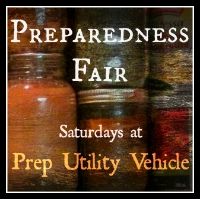Emergency Preparedness – Depression and Anxiety

What if access to medication and medical care is denied?
So in my previous post, Emergency Preparedness, I was wondering how people on prescribed medications would handle an emergency situation if access to medication and medical care is denied. As I mentioned in the same post, I'm not a gloom and doom person but it is a concern when so many people are on prescribed medications. We have experienced so many natural disasters here in our country and around the world in recent years, these disasters caused a lot of trouble and many people had to wait days before they could get any help. It is not possible to stockpile prescribed medication so many people will be suffering if access is denied to medicine and medical care. For some it could be fatal.
It's time to start taking charge of your own health now! You'll be a lot better prepared for emergencies if you start learning about natural remedies so you can reduce your dependence on Western Medicine.
Responsibility for our own health
Way too many people put faith into the medical system without taking responsibility for their own health. Medications are often prescribed without dietary advise and many times there's no intention of trying to quit the drugs. I've seen first hand how type 2 diabetes have turned into an insulin dependence just because the person didn't have the knowledge about dietary changes.
Customers for life
Despite what the doctors say, many health conditions are reversible so you have to remember the doctors are in the business of creating longterm customers.
Natural solutions
Below are some natural solutions to the most prescribed drugs in America today.
Treat the body holistically
It is important to remember to take a holistic approach to healing and not only rely on natural remedies. Dietary changes, living a toxin free life, exercise, sufficient rest and sleep, and incorporating other healing therapies into your life should also be considered.
#1 Anti-depressant and anti-anxiety drugs are among the most prescribed drugs in our country.
Anxiety and depression
- Historically foods that are rich in the valuable minerals phosphorus, magnesium, and potassium has been suggested. Fish, green leafy vegetables, raw nuts and seeds, garlic, bananas, broccoli, apricots, avocados are rich in these minerals.
- Avoid everything with refined sugar or other simple carbohydrates.
- Get regular exercise.
- The longterm effect of coffee and alcohol is increased anxiety.
- Learn to relax the mind and the body.
- Sun and bright light triggers a response to the brain hormone melatonin, which is produced by the pineal gland, which is in part responsible for preventing depression.
- According to Battaglia, vitamin B3 deficiency is often associated with depression and anxiety.
- According to Battaglia, mineral deficiencies in calcium and magnesium can lead to nervousness and anxiety.
- Studies suggest that omega -3 fatty acids may be helpful for depression and anxiety.
Time for the oils
According to Battaglia, bergamot, lavender, jasmine, frankincense, lemon, lime, rose and ylang ylang have traditionally been used for anxiety and depression.
Remember
Never quit any prescribed medication on your own since it may be dangerous. Some medications needs to be weaned of slowly. Consult with your doctor first.
Before you leave:
I recommend that you always perform a skin patch test when you try a new oil.
Check out my safety page to make sure you are aware of any contrindications before you use essential oils. Some oils are not suitable when suffering from certain conditions. Also, Read this Before You Start Using Essential oils. Some oils should not be applied prior to sun exposure so make sure you check this list before spending time in the sun.
Not sure how to apply the oils? Visit these pages to learn how to apply the oils:
- Topical Application
- Inhaling Essential Oils
- Are You Diffusing the Oils Correctly?
- How to Dilute Essential Oils
- Vita Flex Technique
If you're new to essential oils you might want to check out my Getting Started Guide.
------------------------------------------------------------------------------------------------------------
Sources:
Connie and Alan Higley, (Twelfth Edition, revised 2010). Reference Guide for Essential Oils. Abundant Health
Gary Young, ND (2006). Essential Oils, Integrative Medical Guide. Essential Science Publishing
Salvatore Battaglia (1995). The Complete Guide to Aromatherapy. The Perfect Potion Pty Ltd
Julie Behling (2011). Medical Preparedness for Adults E-book
10:23 AM |
Read more...
Essential Oils and Anxiety

It is important to consider each individual's personal preference when choosing oils. I choose the following oils based on their therapeutic properties and their historical uses.
Basil, Ocimum basilicum, equalizes the nervous system and it has historically been considered an ideal oil for nervousness and anxiety. It works as a tonic for the nervous system and builds people up when depleted since tonics are nourishing, restorative and supportive. As a nervine it will also strengthen the nervous system and act as a stimulant. It is an uplifting scent and gives the mind clarity. Basil's antispasmodic action may alleviate palpitations in an anxiety attack. Basil has historically been very useful for anxiety and other psychological disorders.
Bergamot, Citrus aurantium var. bergamia is a good choice for the nervous system. It is both uplifting and sedative, and has historically been useful for anxiety and other psychological conditions. The nervine action of bergamot strengthens the and tones the nervous system. As many nervines, bergamot is also an antispasmodic and a relaxant. Bergamot's antispasmodic action may relieve Tachycardia (rapid heart rate), one of the symptoms of anxiety. It is also a tonic and as mentioned above, tonics are restorative, supportive and nourishing and will benefit the nervous system. Bergamot's uplifting, slight spicy flowery citrus scent is well liked by most. It is also one of the most effective oils the nervous system.
Cedarwood, Cedrus atlantica, is a sedative and therefore suitable as a relaxant for anxiety and nervous tension. It's calming and soothing actions are comforting in anxiety.
Roman chamomile, Anthemis nobilis, has antispasmodic, sedative, and tonic actions. The antispasmodic action may help with symptoms like palpitations while the tonic effect may nourish and support the nervous system. The sedative effect makes it a calming but yet not depressive oil to use. Roman chamomile is a well known oil for the nervous system.
Anise, Pimpinella anisum, is another oil to consider. Anise is very comforting to the mind due to it's warm and spicy scent. It's antispasmodic effect may relax and prevent palpitations.
Let's not forget the other oils that historically been used for anxiety:
Ylang ylang, lavender, orange, frankincense, patchouli, jasmine absolute, and rose.
Thanks for visiting!
Johanna is an aromatherapist and she is passionate about educating people about health, essential oils, real food, natural remedies, and nutrition so they make healthier choices in their lives.
Follow Johanna on twitter and facebook for more health tips and information.
1:58 PM |
Read more...














